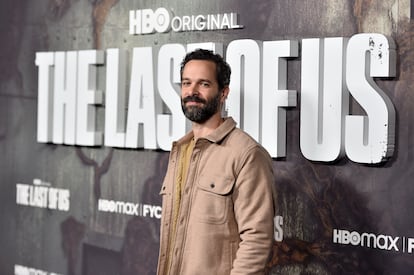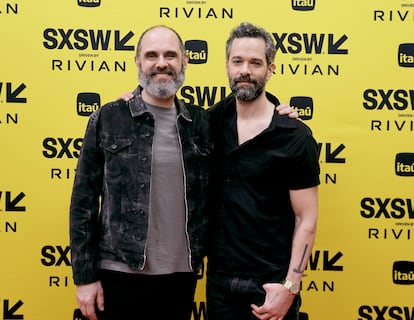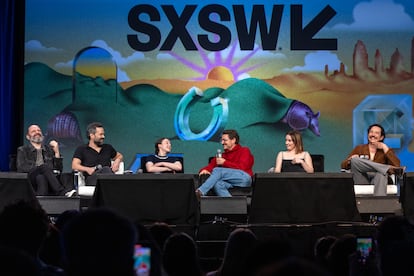Neil Druckmann, creator of ‘The Last of Us’: ‘Boredom is our biggest enemy; if the show feels boring, then we’re doing something wrong’
The mind behind the video game and the television adaptation, which is premiering its second season, talks about his experiences in both formats and the challenges of maintaining the show’s huge success

He started out like everyone else, as an intern at a video game company, but ended up on an unusual path: becoming one of the most-watched content creators in the world for his ability to blend fiction and the ways he represents it. Neil Druckmann, born in Tel Aviv 46 years ago and based in the United States, is the mind behind The Last of Us, one of the most innovative and successful video games of the 21st century. He also devised the idea of bringing the game to television with a quality rarely seen before in this format, turning it into a series that has garnered critical and popular acclaim.
The Last of Us is back, two years after its first season aired. On April 14, it premieres on Max with a seven-episode run, which may seem a bit short to viewers. In July 2024, in a long chat in Vancouver, Canada, in the industrial warehouse where the series is filmed, Druckmann tried to explain that for him it was the natural thing to do. He told this to various media outlets — including EL PAÍS, invited by the platform — to whom he expressed his happiness with the entire writing and creation process, and he fiercely defends the cut in the seventh episode, which they made naturally. “The scope is bigger for this story, which is why it’s it’s beyond a single season. The reason we picked seven episodes isn’t that HBO told us ‘you got to do this amount.’ They said you guys find a natural break point where you feel like that’s a good stop for the season, and we’ll support that number,” he explains. They found it, and decided to end it there. “Then we have future plans of where things would go.”
The creator takes risks in The Last of Us, including personal ones, including directing, something he’s particularly excited about. He admits that directing and writing has been “wild,” something he finds hard to describe. “You’re just watching it on the TV, something built in zeroes and ones, and you get to stand in it. It’s as if someone made Disneyland just for me,” he laughs. “It’s so hard not to just walk around with a grin on my face and just geek out over everything that’s here, and to have a very professional serious face like I’m a serious director.” He also acknowledges the “enormous privilege” he enjoys: “I was moved to tears watching it,” he says of his episode in season two.
When he decided to launch the series, Druckmann was clear that he was striving for excellence. It’s something he often repeats: he has the best cast, the best makeup team, the best of the best, from all over the world. The standards are higher today, following the enormous success of the first season. The first episode alone, broadcast in January 2023, drew over 40 million viewers in the United States, as revealed by its co-creator, Craig Mazin, whom Druckmann defines as “allergic to boredom.” “Boredom is our biggest enemy; if the show feels boring, then we’re doing something wrong,” he says of Mazin and their way of working together. “I think the challenge now is that the first season was so successful you feel that stress, you feel the pressure of wanting to make sure that not only do we match it, how do we top that quality?” he affirms. “I can’t worry about how someone else will react; I can’t predict whether they’re going to like it or not. So all we can do is make something that we feel is great, that we feel honors everything that came before it, honors where it’s going in the future, feels grounded, feels real, speaks to themes that are very relevant to the world we live in today, and then surrender to whatever the reaction is.”

That’s why the president and creative director of Naughty Dog, which publishes the video game, isn’t intimidated by what people will say: those who followed the game, or fans of the first season — who will find changes in this one — or from new acolytes. “If you start trying to imagine what someone else will think, you’re losing your own instinct as storytellers, writers, and artists,” he argues. For him, the key is to give the viewer “the same kind of conversation, the same kind of feelings that the game gave,” but with different formats, which means “certain things have to change.” In fact, Druckmann acknowledges that now, with the series, he would have altered certain “small” things in the fiction with respect to the game. “I’m very careful with that stuff because I don’t want to just do something new because maybe I’m tired of it or I’ve already written it so it needs to be new just to make it fresh for myself.”
Both formats are very different in terms of generating sensations, Druckmann is aware. Interactivity is different; playing integrates more powerfully into the narrative than just being a spectator. And that affects how the story is told: for example, the solo character moments that move the game forward, but don’t work on television. “If you try it in the show, it becomes very stale and boring after a while. But it’s a great opportunity for us to develop that Ellie and Dina relationship even more so than stuff we’ve seen in the game,” he explains. Therefore, the focus has to be on the people and their interrelationships; that’s what makes it not just a character shooting off. For example, he knows there were moments of enormous power in the first season that were etched in the viewer’s retina and will be difficult to replicate. “We can’t have our giraffe moment [he says about an iconic scene from the video game]. We already had our giraffe moment. But we can create something similar where you can develop a relationship beyond the main plot. So there are things like that, but not exactly.”

To create these moments, Ellie (played by Bella Ramsey) is central to this second season. For Druckmann, after the first season, “she’s now experiencing trauma and violence that has changed her forever”; in fact, for him, the first season is based on trauma and its recurrence, but they tried not to repeat it in season two. Here, Ellie is entering adulthood: “You’ll get to see the further growth of this character and it’s the privilege we have, of spending so much time with this one character you really get to flesh them out in all these different ways.”
“We really swung for the fences and did some pretty controversial things because we didn’t want to repeat ourselves. And that’s been our approach for season two as well,” he adds. “The beautiful things it could lead you to, and sometimes the really horrific things it could lead you to, like the decision Joel makes at the end of season one. Now we get to deal with, well, what is the impact of that? What is the ripple effect that started in this first season, and how has it affected these characters and the world around them and other communities, and you get to see the impact of that going forward.” Despite that reflection, Druckmann admits that he avoids thinking too much about the future and that after the series, he’ll see what happens: “My love for video games will never go away; I will always go back to them.” So, when the game is over, will the series end? “This is an adaptation. We like having a direction. We know what the ending is, and we’re kind of heading towards that. And once we’re done, we’re done. This is not the kind of show that’s just going to keep going on forever..”
Sign up for our weekly newsletter to get more English-language news coverage from EL PAÍS USA Edition
Tu suscripción se está usando en otro dispositivo
¿Quieres añadir otro usuario a tu suscripción?
Si continúas leyendo en este dispositivo, no se podrá leer en el otro.
FlechaTu suscripción se está usando en otro dispositivo y solo puedes acceder a EL PAÍS desde un dispositivo a la vez.
Si quieres compartir tu cuenta, cambia tu suscripción a la modalidad Premium, así podrás añadir otro usuario. Cada uno accederá con su propia cuenta de email, lo que os permitirá personalizar vuestra experiencia en EL PAÍS.
¿Tienes una suscripción de empresa? Accede aquí para contratar más cuentas.
En el caso de no saber quién está usando tu cuenta, te recomendamos cambiar tu contraseña aquí.
Si decides continuar compartiendo tu cuenta, este mensaje se mostrará en tu dispositivo y en el de la otra persona que está usando tu cuenta de forma indefinida, afectando a tu experiencia de lectura. Puedes consultar aquí los términos y condiciones de la suscripción digital.









































